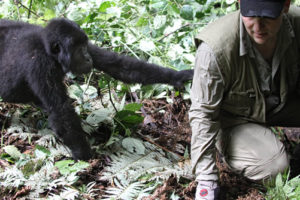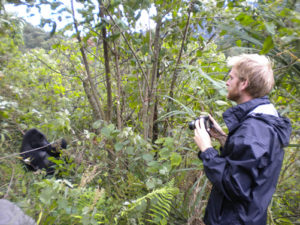Uganda through the Tourism Minister Tom Butime has officially relaunched gorilla trekking to international visitors. This follows the recent opening of the airports and tourism by the president of Uganda on the 20th of September. Rwanda had already restarted primate tours about 3 months ago and it was only a matter of time before Uganda did the same. According to the minister, Uganda is now prepared to welcome international travelers who are cleared into the country.
 Is COVID-19 a threat to gorillas and other primates? Although no research has been carried out regarding the threat of COVID-19 to gorillas and other primates, there is enough information for primatologists to be worried. During gorilla trekking for example, tourists get very close to the primates. Gorillas are very prone to cough and flue. Gorillas can get very sick or even die if they get sick of flue, cough or other human related diseases. When you go through the gorilla trekking rules, you will notice that a lot of emphasis has been put on measures to prevent the spread of any airborne diseases. The way COVID-19 is spread and the symptoms clearly indicate that the coronavirus would be a real threat to gorillas and other primates. It is because of this threat that governments in Africa suspended primate tourism as soon as the coronavirus begun spreading globally.
Is COVID-19 a threat to gorillas and other primates? Although no research has been carried out regarding the threat of COVID-19 to gorillas and other primates, there is enough information for primatologists to be worried. During gorilla trekking for example, tourists get very close to the primates. Gorillas are very prone to cough and flue. Gorillas can get very sick or even die if they get sick of flue, cough or other human related diseases. When you go through the gorilla trekking rules, you will notice that a lot of emphasis has been put on measures to prevent the spread of any airborne diseases. The way COVID-19 is spread and the symptoms clearly indicate that the coronavirus would be a real threat to gorillas and other primates. It is because of this threat that governments in Africa suspended primate tourism as soon as the coronavirus begun spreading globally.
Suspension of Gorilla trekking due to COVID-19
What has been happening after the suspension of gorilla trekking? Well, we are happy to report that there has been a baby boom since the start of the lockdown and suspension of gorilla tourism. Five females have given birth so far with the latest occurring in the Rushegura gorilla group. It is important for the primates to remain comfortable with humans in their presence for gorilla trekking to be possible. There is a risk of shock and migration to join wild families deep in the forest if humans reappear after a long time in their so-called lockdowns.
![]() In order to ensure that the primates remain habituated, the park Rangers have been visiting all gorilla groups on a daily basis. They have been equipment with squirt sanitizers, face masks and other protective gear to be used when close to the primates. The Rangers ensure that they keep a distance from the primates in all their interactions. It is important to note that organizations like UNESCO have been supporting gorilla parks during the coronavirus crisis. UNESCO released emergency funds to Bwindi Impenetrable National Park to be used for acquiring personal protective gear, monitoring the gorilla groups and any possible disease outbreaks.
In order to ensure that the primates remain habituated, the park Rangers have been visiting all gorilla groups on a daily basis. They have been equipment with squirt sanitizers, face masks and other protective gear to be used when close to the primates. The Rangers ensure that they keep a distance from the primates in all their interactions. It is important to note that organizations like UNESCO have been supporting gorilla parks during the coronavirus crisis. UNESCO released emergency funds to Bwindi Impenetrable National Park to be used for acquiring personal protective gear, monitoring the gorilla groups and any possible disease outbreaks.
Gorilla trekking after the Coronavirus
Why is gorilla tourism open amidst a deadly pandemic? That was a good question and with a good answer. Gorilla tourism brings in more tourists to Uganda, Rwanda and Congo than anything else. It is the only way to raise money to protect the primates and fund wildlife research in developing countries. The money is needed to recruit and pay Rangers who patrol the parks. Only recently, a silverback gorilla named Rafiki was killed by poachers in Uganda during the COVID-19 related lockdown. Poaching in Uganda’s national parks increased massively because there was a laxity after the government imposed curfews and lockdowns. The Uganda Wildlife Authority found over 822 snares in Bwindi Impenetrable National park alone between March and April 2020 compared to 21 around the same period in 2019.
Without tourism money, a few people may not see the value of protecting park animals and may find poaching irresistible. Closing national parks may not be an issue in developed countries but it is  unsustainable in poor countries were poaching is also rampant. The two governments considered all the above factors and also the overall status of the COVID-19 pandemic before arriving at a decision to restart gorilla tracking.
unsustainable in poor countries were poaching is also rampant. The two governments considered all the above factors and also the overall status of the COVID-19 pandemic before arriving at a decision to restart gorilla tracking.
The safety of international visitors and animals will be highly prioritized when visiting both Uganda and Rwanda. As they reopen primate tourism, the governments have prepared standard operating procedures to help protect tourists and primates. They are also working closely with Primate researchers and the Gorilla Doctors to come up with measures to reduce any chance of disease transmission during gorilla trekking.
Measures to protect primates from the Coronavirus during gorilla trekking
In an effort to contain the spread of the Coronavirus and protect tourists who will be coming for gorilla tracking, the Uganda Wildlife Authority has come up with rules to protect visitors, staff and wildlife. It has provided Rangers with Personal Protective equipment to avoid transmission of diseases to the fragile primates. The Authority has formed a COVID-19 task force to work with the National Coronavirus Task Force closely. This UWA internal task force helps inform management about new developments and decisions by the COVI-19 National Task Force. The Uganda Wildlife Authority is also working closely with the Uganda Tourism Board. The two have come up with separate but complementing recommendations that should be followed by Tour operators, Tourists and personnel working in National Parks during/after the COVID-19 Pandemic. They generally include: –
- Prohibiting any bicycles or commercial vehicles entering into protected areas.
- Prohibiting large groups of more than 25 from entering the national parks and reserves.
- Temperature screening of all travelers at the airports and border crossing points.
- Handwashing at the national parks and offices which deal with tourists.
- Provision of sanitizers by tour operators and sharing the most current measures by the governments to contain COVID-19 including how to identify symptoms of the coronavirus.
- Equipping all personnel working in national parks with the right gear and tools to test tourists who show up for the briefing on gorilla trekking.
- Introducing face masks to all tourists before, during and after gorilla trekking. It is the responsibility of accommodation facilities and tour operators to maintain stock of recommended face masks for their guests. Tour operators and accommodation facilities should train their staff and guests about the preventive measures to stop the spread of COVID-19.
Safety when planning for gorilla trekking in Uganda during COVID-19 pandemic
![]() You might now be asking yourself this question. How do I stay safe when traveling for gorilla trekking amidst the Coronavirus pandemic? A better question would be – What can you do as an individual to stop the spread of COVID-19? In order to keep safe and help governments control the spread of the coronavirus, you should avoid handshakes and body-hugging while on your safari. Always wash your hands with disinfectants and clean door handles or other objects you frequently touch. If you can, travel with your own preferred but recommended face masks.
You might now be asking yourself this question. How do I stay safe when traveling for gorilla trekking amidst the Coronavirus pandemic? A better question would be – What can you do as an individual to stop the spread of COVID-19? In order to keep safe and help governments control the spread of the coronavirus, you should avoid handshakes and body-hugging while on your safari. Always wash your hands with disinfectants and clean door handles or other objects you frequently touch. If you can, travel with your own preferred but recommended face masks.
All those registered for gorilla trekking must follow all the gorilla trekking rules such as keeping a distance of at least 7 meters away from the nearest gorillas. This distance must be adhered to even when the primates attempt to come closer out of curiosity. It is the responsibility of the tourist to avoid anything that might alert the primates or make them get closer. Gorillas are attracted to feed, bright colors. You can read more about the standard operating procedures for gorilla trekking during COVID-19.
Do not join the tracking party if you have a cold or symptoms like general body weakness, fever, a sore throat, coughing and sneezing. Gorillas are very prone to human diseases and especially those that affect the respiratory system. If you feel like sneezing or coughing, cover your mouth. Never eat or drink while in the presence of gorillas. Never litter the park because you could leave behind items that contain germs and are dangerous to the primates.

